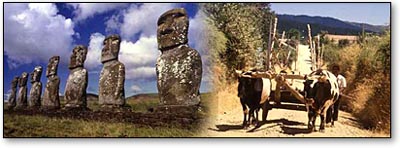
History & Culture
Surrounded
on three sides by virtually impassable barriers, Chile's rich central
valley remained
largely unknown to the outside world until
the middle of the fifteenth century, when the Incas began their great conquests
of much of the continent. Under Tupac Yupanqui, an Inca army succeeded in crossing the six
hundred mile string of salt basins that are the Atacama Desert, moving from oasis to oasis
in a region so dry that some parts of it show no evidence of ever having been rained
upon. After coming at last into the central valley, the Incas encountered
the Mapuche, one of the three Araucanian peoples who occupied the region.
The
invading army seemed at first to be enjoying the same success that the Incas
were experiencing all over South America, and they advanced about half way
down the valley's five hundred mile length. However, the Incas soon found
that they had
met their match in the Mapuche, who decisively defeated the Incan attempt
to cross over the Rio Maule into the Lake District. The Incas established
a stable presence in the territory they had gained, but they did not see
fit to pursue the redoubtable Mapuche any
further.
Less than a century later, a Spanish army attempted to do just that. In 1541, Pedro de
Valdavia crossed into the central valley, having followed the Inca road south from Peru.
He founded Santiago in February, and soon afterward crossed into Mapuche domains and
established strongholds there. In 1553, in a gesture no doubt familiar to the Spaniard
Valdavia, they bound him to a tree and beheaded him.
For the next four hundred years the Spanish, like the Incas before them, found it
appropriate to maintain a massive defensive presence in the central valley. During these
centuries the regions under Spanish control were permitted to trade directly with Peru:
smuggling flourished, and privateers swarmed along the coasts.
Chile gained its independence from Spain in 1817, after seven years of warfare. The
Mapuche region to the south, which had remained largely independent of Spanish rule, also
resisted the new Chilean government. Capable of marshalling full cavalry forces and even
modern artillery, the Mapuche succeeded in holding onto their autonomy until the middle of
the century, when large numbers of armed settlers gradually moved into the region.
Although Chile's war of independence brought into place a system of representative
democracy, the country's political history has not always been smooth. In 1970, a Marxist
government under Dr. Salvador Allende came to power, having responded to the perceived
failure of the established liberal party. Allende's attempts to radically change the
structure and direction of the country brought about a second political crisis however,
and in 1973 a right-wing government under General Augusto Pinochet Ugarte seized power
with assistance from the United States Central Intelligence Agency. Allende was killed in
the coup, and Pinochet's government maintained power for the next
decade and a half, frequently resorting to terror in order to stifle discontent. In 1990,
having failed in his bid to gain popular ratification for his rule, Pinochet handed over
the presidency to the rightfully- elected Patricio Aylwin Azocar. Chile's political
climate has since remained stable, although there is still considerable tension between
the military and the government concerning the human rights violations of the Pinochet
era.
Chile's population is composed predominantly of mestizos, who are
descended from marriage between the Spanish colonizers and the indigenous people. The
surviving indigenous groups consist of the Aymara, in the north, and the Mapuche, who
number roughly 100,000 and continue to inhabit the forested areas of the lake district.
Chile is also home to a number of significant immigrant groups, including minority
populations from virtually every European country. There are signifcant numbers of Basques
and Palestinians. The high proportion of mestizos among Chile's people has made race a
minor issue in comparison to class, which continues to be a source of considerable
tension. The great majority of Chile's people, as one might expect, are concentrated in
the central valley. Spanish is the country's official language, but some of the Indian
dialects remain. In the north, they speak Aymara, in the south Mapuche, and on Easter
Island the Polynesian language of Rapa Nui.
Copyright (c) 1998 - 2010 interKnowledge Corp. All rights reserved.
 .
.